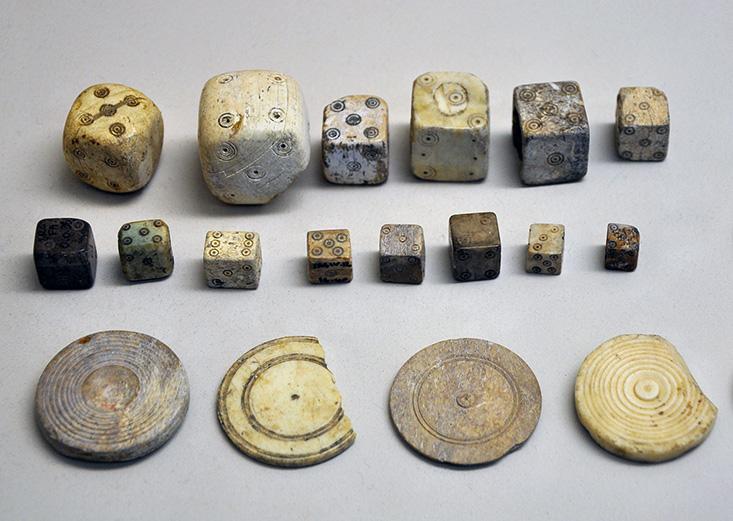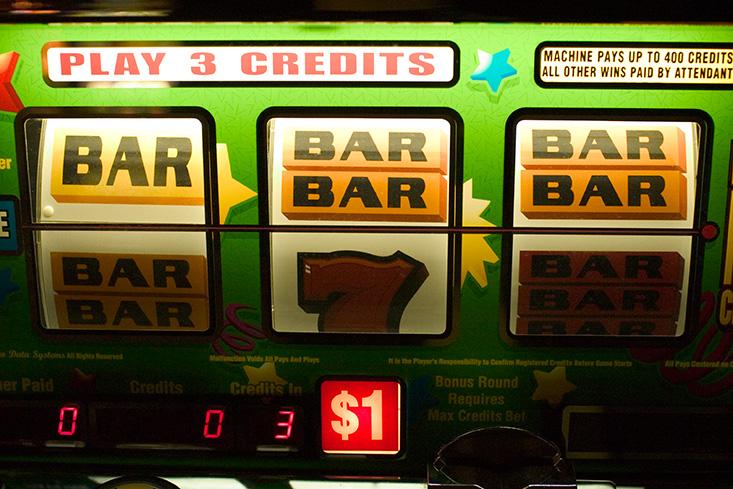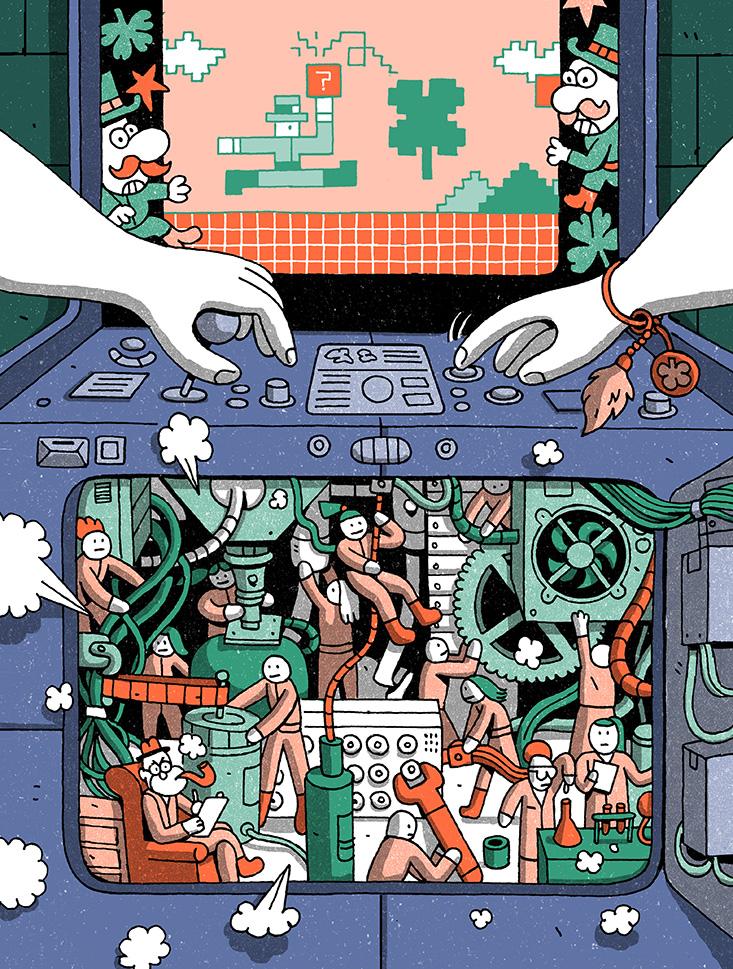On Sept. 16, 2007, a Japanese YouTuber who goes by the handle “Computing Aesthetic” uploaded a forty-eight-second-long video with the deafening title, “ULTRA MEGA SUPER LUCKY SHOT.” The video shows a high-scoring shot in Peggle, a vastly popular video game, loosely based on Japanese pachinko machines, in which a ball bearing clatters down the screen, accruing points as it bounces through a crowd of candy-colored pegs, which disappear shortly after being touched; more bounces, more points. Although Peggle involves some skill—before firing the ball, the player must carefully aim the launcher that dangles at the top of the screen—you are principally at the mercy of the luck of the bounce. In Computing Aesthetic’s footage, the points pile up as the ball bounces fortuitously between pegs. To underscore the seemingly miraculous shot, Beethoven’s “Ode to Joy” blares euphorically until, in the video’s final moments, the ball bearing sinks into the bucket at the base of the screen and the words “FEVER SCORE” flash onscreen. The description on the video, which has been watched nearly a quarter of a million times, reads, “I couldn’t balieve this when it happened!!!!!!!!!”

Computing Aesthetic’s video is just one of nearly 20,000 such YouTube clips labelled with the words “Peggle” and “Lucky,” uploaded by players so amazed at their good fortune in the game that they were moved to share the achievement with the world. But these players may not be as lucky as they’ve been led to believe. “In Peggle, the seemingly random bouncing of the balls off of pegs is sometimes manipulated to give the player better results,” Jason Kapalka, one of the game’s developers, admitted to me. “The Lucky Bounce that ensures that a ball hits a target peg instead of plunking into the dead ball zone is used sparingly. But we do apply a lot of extra ‘luck’ to players in their first half-dozen levels or so to keep them from getting frustrated while learning the ropes.” Tweaking the direction of any given bounce by just a few compass degrees—but not so much that the ball swerves unrealistically in mid-air—is enough to encourage beginners and not make the game too unbelievable, Kapalka said.
Fairness is the unspoken promise of most video games. Controlled by an omniscient and omnipotent designer, a video game has the capacity to be ultimately just, and players expect that it will be so. (Designers also have an incentive to be even-handed: A game that always beats you is a game you’ll soon stop playing.) And yet, when video games truly play by the rules, the player can feel cheated. Sid Meier, the designer of the computer game Civilization, in which players steer a nation through history, politics, and warfare, quickly learned to modify the game’s odds in order to redress this psychological wrinkle. Extensive play-testing revealed that a player who was told that he had a 33 percent chance of success in a battle but then failed to defeat his opponent three times in a row would become irate and incredulous. (In Civilization, you can replay the same battle over and over until you win, albeit incurring costs with every loss.) So Meier altered the game to more closely match human cognitive biases; if your odds of winning a battle were 1 in 3, the game guaranteed that you’d win on the third attempt—a misrepresentation of true probability that nevertheless gave the illusion of fairness. Call it the Lucky Paradox: Lucky is fun, but too lucky is unreal. The resulting, on-going negotiation among game players and designers must count as one of our most abstract collective negotiations.
In ancient times, luck was routinely ascribed to divine intervention; games were as much a playground for the gods as a test of human ability. Luck was a central component in the games of the ancient Egyptians, whose deity Theuth was the inventor of dice, according to Plato. In practice, the dice were typically made from astragali, knucklebones of hoofed quadrupeds, which were polished and used in Egyptian board games and in a type of fortune-telling divination called astragalomancy. Loaded dice have been found in tombs alongside ancient game boards; even if the ancient Egyptians believed that a throw of the dice somehow expressed divine will, they weren’t averse to lending a helping hand.
Olaf Haraldsson, an 11th-century Norwegian king, once wagered a kingdom in a faith-testing game of dice. Olaf was locked in a territorial dispute with the king of Sweden over the island of Hising; eventually the two agreed to settle the matter with a dice throw. The Swedish king rolled two sixes, the highest possible score, and said there was no point in continuing the game. Olaf insisted on taking his throw; a recent convert to Christianity, he was certain that God would steer the dice in his favor. His faith was vindicated with double sixes. The men continued to take turns throwing their dice, twelve after twelve. The matter was finally settled when, during Olaf’s final throw, one of the dice split in two, to show both a six and a one, winning him the kingdom on an unprecedentedly lucky 13.
Luck is equally vital in modern games, whether it emerges from dice rattling in a cup or the treacherous Chance cards in Monopoly. But its role has changed: Humans have taken the reins from the gods, and luck has become a design tool capable of changing players’ experiences and expectations. For instance, it enables players of varying abilities to play together by reducing the advantage of actual skill. The New York-based designer Zach Gage recently decided to reinvent chess by introducing a hefty element of luck. “Chess is historically a very balanced game that is entirely up to the skill of the player,” he said. “This is great if you want to see who is better at chess but not so good if you’re trying to play a fun game with your friends of varying skill levels.”
Lucky is fun, but too lucky is unreal.
Really Bad Chess, by contrast, gives each player a randomly selected set of pieces at the start of each match. The sides don’t mirror each other, so it’s possible for one player to end up with five queens and the other with a battalion of pawns. “This accomplishes two things,” Gage said. “It makes weaker players feel like they have a chance against stronger players because they can end up with better pieces. And it makes the relative strength of the board hard to analyze, even for an expert.” Here, as in poker, victory is determined as much by the luck of the draw as by the talent of the player. The design also allows Gage to secretly stack the probability of the initial draw—making it more likely, say, that a new player will hold more powerful pieces, while an experienced player will be left at a starting disadvantage.
In mechanical games, luck is the player’s saving grace against the mechanism itself. In the early 1950s, the Chicago-based pinball manufacturer Gottlieb noticed that novice pinball players would occasionally lose a ball in the first few moments of a game. So it introduced an inverted V-shaped metal wall that, during a game’s opening seconds, would rise between the flippers at the base of the machine in order to keep an errant ball from disappearing down the gulley. In newer pinball machines, the blocking gate, known as a “ball saver” (a phrase invented by Chicago Coin for its 1968 pinball machine, Gun Smoke), is controlled by software; whether the wall rises or not is a matter of luck, of a kind that has been engineered into the algorithm.

In fully digital video games, luck is even more deeply baked into the experience, and must be actively simulated. When the soccer ball sails past the goalkeeper in FIFA, or when, inexplicably, a herd of race cars slows down to allow you to catch up, a game designer’s hand has just acted to provide some ghostly rigging. The effect of this manipulation is to flatter you and thereby keep you engaged. But it’s a trick that must be deployed subtly. A player who senses that he’s secretly being helped by the game will feel patronized; after all, luck is only luck if it’s truly unpredictable.
Which is where the problems begin.
When gods were held responsible for luck, we were limited to prayerful petitions for good fortune. Now the architects of our fate in games can be looked up on LinkedIn. With this knowledge, our sensitivity to odds that don’t feel quite right has been heightened, and designers need to compensate.
“As soon as the player becomes aware of any sort of pseudo-randomness, it risks undermining the joy of getting lucky,” said Paul Sottosanti, a designer at Riot Games, publisher of League of Legends, the world’s most-played online game. Games in which you’re given seemingly random rewards often employ a device known as a “pity timer,” Sottosanti explained, which guarantees that something seemingly fortunate will happen to you after a sustained period of misfortune—anything from 10 minutes to an hour, depending on the game. In World of Warcraft, every time players defeat a foe, they hope to receive a “Legendary”—one of the game’s highly powerful weapons. Legendaries have an infinitesimally small chance of being “dropped,” but are also on a pity timer. “Fatigue can set in where a player is just waiting for the pity timer to kick in,” Sottosanti said. “The primary emotion they feel upon finally finding a Legendary is often not joy but relief, perhaps tinged with sadness.”
Humans have taken the reins from the gods, and luck has become a design tool capable of changing players’ experiences and expectations.
While some instances of pseudo-randomness are designed to create the feeling of fairness, others are designed for profit. With the rise of so-called freemium games—free games that make real money during the course of play by selling virtual items—comes the temptation to manipulate what looks like a random act of chance in order to encourage further spending. Sottosanti pointed to the popular virtual card game Hearthstone as an example of “pity timers” being used well. “The chance of getting a valuable card increases with each pack that doesn’t contain one,” he said. “You’re virtually guaranteed to open one after around 40 packs.” The packs are available for sale to players.
It’s a technique straight out of the 1950s playbook of the American psychologist B.F. Skinner. Whether the subject is a pigeon, rat, or person, Skinner found, the strongest way to reinforce a learned behavior was to reward it on a random schedule. The designers of free-to-play games, by using an intermittent variable to dole out small prizes, found that they could keep players engaged—and spending—for longer.
Natasha Schüll is an associate professor of Media, Culture, and Communication at New York University, and the author of Addiction by Design: Machine Gambling in Las Vegas. When a player feels favored by luck, she said, “you can pin it to certain neurotransmitters spiking, and you know dopamine is released. Even the compulsive search and hunt for recreating that sense of euphoria is driven by the reward center in the brain.” Dopamine’s power to turn us into luck-chasers can be seen most vividly in the effects of some drugs used to treat Parkinson’s disease, which, in flooding the brain with dopamine, have been shown to turn patients into gambling addicts.

And the temptation to manipulate the appearance of probabilities, in order to appeal to the human brain, is nowhere greater than in the gambling industry, where, whether the game is hosted on the Internet or in a physical machine in a casino, software usually handles the calculations. The results of any modern slot machine are based on arcane random-number generators in a computerized network, not on the fortunate conjunction of three wooden wheels. But losing to that sort of luck can be dispiriting. So gambling machines often employ the fiction of physical luck—by, say, making it look as if you just missed out on a king’s ransom as the final matching bar of gold or lemon reels to a stop just shy of a jackpot payout. This entices you to once more bet on odds that remain astronomical.
“Near-misses literally generate mixed feelings,” Luke Clark, a psychologist and director of the Center for Gambling Research at the University of British Colombia, said. “On the one hand, people experience near-misses as aversive, but at the same time, the near-miss increases motivation. On a slot machine, a near-miss makes you more likely to continue, because it makes you feel like you’re improving at the game.”
For games based heavily upon luck, maintaining this illusion of improvement and control is crucial. “The key brain structure here is the striatum, a collection of nuclei in the center of the brain, which generally regulate both movement and reward,” Clark said. That brain region seems particularly important to the feeling we had a hand in our own good luck. “The same region is implicated in the formation of habits, which is also obviously relevant to addiction.”
Persuading a player that he’s improving at a luck-based game in turn increases the likelihood that he’ll take on unfavorable odds. “For years the gambling industry has had the ability to track individual players, create robust historical profiles on customers, and employ algorithms that can tell when someone is likely to leave,” Schüll said. The operators of digital gambling machines have the ability to change payout odds in the middle of a gambling session based on these profiles, by giving a player a small payout in order to tempt him or her to keep playing. Many states have laws that forbid “luck” from being manipulated in this way. To get around that, casino operators dispatch so-called “luck ambassadors,” who go onto the casino floor and hand gamblers a cash bonus to keep them invested. Freemium games, which aren’t currently subject to the same legal strictures that bind the gambling industry, can freely give these bonus payouts during the game in order to make a player feel lucky—and so keep them playing and spending.
Some designers have sworn off pulling the levers of luck at all. For a long time Larry DeMar, a noted pinball-game designer who worked with Williams, avoided using the ball-saver in the company’s designs, believing it undermined the purity of the game. If you lose, you lose—tough luck for you.
Unfortunately, the pure approach doesn’t always convince players. “Today, players almost always perceive patterns of manipulation where there are none,” Jason Kapalka, the Peggle developer, said. “When I was working on online games, it was nearly impossible to convince certain players that the results weren’t rigged in some way. People came up with elaborate theories about how beginners were given better results so as to rope them into subscriptions, or veteran players would be rewarded with better results for their patronage, and so on.” At one point Kapalka published huge files, revealing hundreds of thousands of simulated die rolls, to persuade skeptical players that the results were truly random.
Game designers, too, can lose the plot. “Even a veteran designer can lose track of some bits and pieces on a big enough project,” Adam Saltsman, a veteran designer, told me. “And even an experienced player can misunderstand a system and attribute skill to luck, or vice versa.”
If play is the way in which human beings rehearse life, it follows that we require our games to be filled with uncertainties, moments of caprice to which we must adapt our position and strategy. But we’ve grown more demanding about the luck that games serve to us—not too much, not too little. What remains constant is our interest in the nature of the luck that we experience. “When we experience luck in a game we feel a deep sense of attunement and alignment, almost like we’ve found the pattern, and predicted it,” Schüll says.
The source of this good fortune—whether it’s the gods or a random probability distribution—is a matter of culture. But the message of an encounter with luck in a game is universally comforting: We have found the thing that we were looking for.
Simon Parkin is the author of Death by Video Game: Danger, Pleasure, and Obsession on the Virtual Frontline, and has written essays and articles for various publications, including the new yorker.com, The Guardian, The New York Times, MIT Technology Review, and the New Statesman.


























